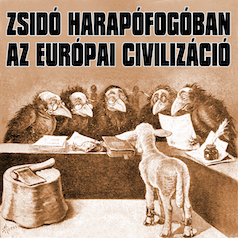Gordon Bajnai, the disgracefully unelected yet reassuringly temporary Prime Minister of Hungary, has departed on his first foreign state visit. His choice of destination comes as little surprise to Jobbik, neither should it shock those who heard Shimon Peres’ speech on the 10th May 2007 in which the Israeli President admitted that his country had succeeded in “buying up Hungary.”
Those of a humorous disposition could be forgiven for thinking that the currently assigned custodian of Israeli business interests in Hungary had been summoned to Head Office to receive his instructions.
But even putting partisan politics aside, given the frequent reporting in Hungary of Mr Peres’ ill-judged remarks, and that the nation is facing the most unprecedented economic crisis in living memory, with an entire generation of Hungarian small business owners and smallholders fearing for their livelihoods and independence like never before: who could possibly question that Mr Bajnai’s choice of destination is anything other than indicative of a scandalous lack of judgement on his part?
The Prime Minister’s disregard for his people is further demonstrated by his continued blissful refusal to face the most pressing concerns of his nation. For as his countrymen are crushed under the weight of the calamitous economic disaster that he himself presides over and that his predecessors orchestrated, Mr Bajnai and his ilk, have judged in their wisdom that it is the struggle against “extremism” that will be their administration’s “first priority;” and not the spiralling fiscal black-hole of debt into which their own signatures have propelled the millions of a once solvent nation, which used to be the economic envy of Eastern Europe.
Mr Bajnai claims that Jobbik’s views “are against Hungary’s interests and damage the country” but then he rather crucially fails to indicate how seeking the full representation of Hungarian interests on the international stage and the protection of Hungarian arable land, its water table, its industries and its national heritage: constitute the “extremism” that he purports to be against.
But if he is so concerned by “extremism”, why is he not so offended by the extremism committed against an entire country? The extremism carried out by countless post-communist officials such as Gyurcsany, Veres, Koka and himself, in conjunction with their globalist partners from 1989 - 2009? The transfer of vast sums in state assets into private foreign hands? The organised tax-evasive transmission of countless billions via off-shore companies by a governing political mafia? The closure of schools and hospitals, post offices and police stations? The utter destruction of an education system that was once studied as an ideal the world over? The toleration and denial of a statistically evidenced criminological fact, namely Roma crime, by a police force that prefers the simpler challenge involved in firing rubber bullets into the faces of demonstrators?
Mr Bajnai is sorely ill-equipped to pass judgement upon what has endangered Hungary “more than anything else over the past twenty years,” for he has been a party to it more than most. In speaking of ideology he draws attention to his own, which consists of nothing more than doing whatever the prevailing political landscape demands for his continued survival. Be that singing The Internationale, as was the case in the past, or indecently stoking the fears of his hosts in Israel, to ensure an enthusiastic reception in the present. Such is the measure of a man, that Hungary now has the dubious pleasure, in this first foreign visit, of sharing with the world.
Perhaps the Prime Minister may be forgiven for refusing to accept that a party, like Jobbik, which on current electoral trends will soon surpass his own ruling MSZP in the polls, cannot by definition be classed as “extreme.”
For Jobbik is the only political party in Hungary unswervingly dedicated to the pursuit, impeachment, prosecution and imprisonment of all those members of the political establishment who have spent the last two decades of their professional and political lives enriching themselves by keeping their hands thrust shoulder-deep in the public purse: and in so doing bankrupted a nation.
Béla Kovács
Foreign Affairs Committee
Foreign Affairs Committee
(Jobbik)






